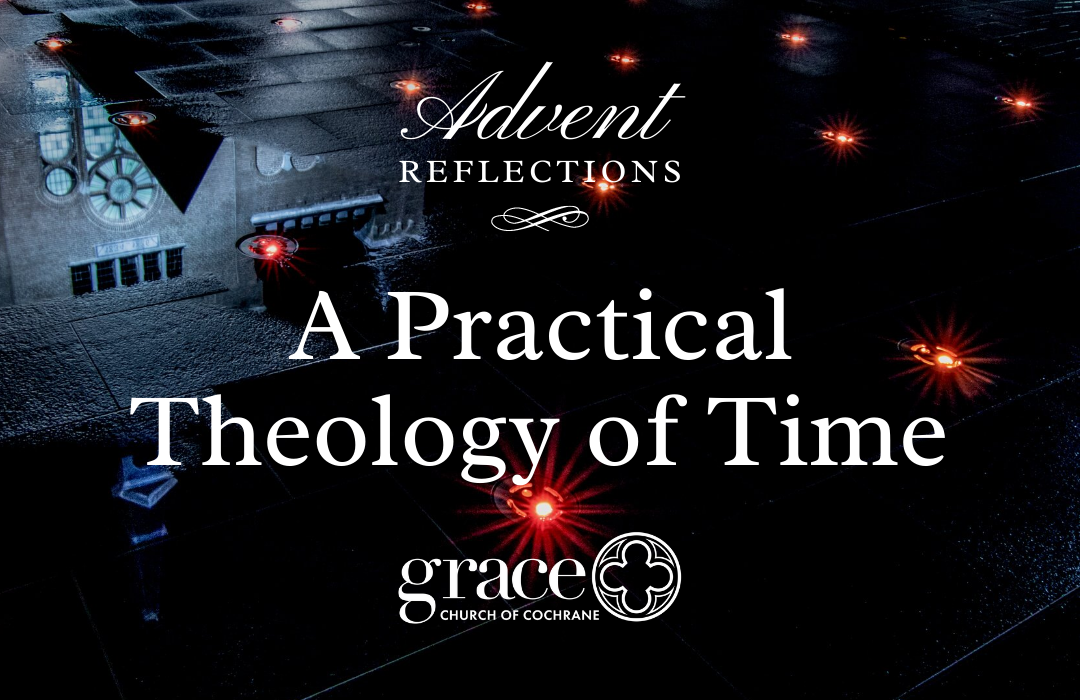A Practical Theology of Time

Christmas is a stressful time for a lot of people. Try walking in a mall these days and the lineups are insane; parking is like looking for a needle in a haystack. People are overwhelmed and frantic.
Why? Lots of reasons, but one of them is time. The clock is ticking; Christmas is coming closer and closer, and there’s still so much to do. Some are feeling this pinch at work; others have family coming and have too many preparations to make; still others have travel plans and too much to take care of before they go.
We’re time-bound creatures. Time is, in essence, the experience of change. We grow older because our bodies change; seasons pass because the weather patterns shift. It’s part of physical existence.
Time is, like every other aspect of our physical universe, a created thing. That means, like the rest of our universe, God has it under his control. Time bends to his will; its passage has been ordained in eternity past. As David put it: Your eyes saw my unformed substance; in your book were written, every one of them, the days that were formed for me, when as yet there was none of them. (Psalm 139:16).
By contrast, God is different. He stands outside of time. He transcends time. As Peter so aptly expressed it, do not overlook this one fact, beloved, that with the Lord one day is as a thousand years, and a thousand years as one day (2 Peter 3:8). Every moment is present to him; he looks at it objectively like any of the other works of his hands. This truth is also seen in the fact that, as God said through Malachi, “I the Lord do not change” (Malachi 3:6). Since time is the experience of change, God by definition cannot, in his essence, be subject to time. It cannot be part of his nature.
We know this as Reformed Christians. It’s a necessary part of an understanding of the sovereignty of God. Yet especially at a time like this, we need to apply that truth. We’re all tempted to forget this, especially at this time of year. Running out of time? I’ve felt that way all week. Many of you have as well.
But our hope cannot be in planners or schedules. Our confidence is not in Microsoft Outlook or Google Calendar. Your ability to multitask or your knack for time management cannot be where you place your trust. None of these things are bad in themselves, but this is a time of the year where we are tempted to act, in practice, as if they really are our hope. No – God must hold that place. His grace is to be sufficient.
What does that look like in practice?
First, it should show itself in a peaceful mindset and attitude in the midst of busy-ness. That doesn’t mean a catatonic state by any means; it’s possible to be dealing with many issues or doing things quickly and still be confident and confident that God has you in the palm of his hand and that he is sovereign. We should have the mind of David, who when considering his sinfulness and God’s judgment upon it, and marveling at God’s forgiveness, proclaimed: “You are a hiding place for me; you preserve me from trouble; you surround me with shouts of deliverance… Many are the sorrows of the wicked, but steadfast love surrounds the one who trusts in the Lord.” (Psalm 32:7,10)
Second, it should be seen in a renewed commitment to prayer. The Spirit is the source of the strength we need to face the challenges God has given us. Do you need assurance or energy or focus or wisdom? Perhaps “you do not have because you do not ask” (James 4:2). I’ve been convicted this week in the midst of crises that I was neglecting my responsibility to bring my cares to God; as I repented and responded with more prayer, the problems and crises did not decrease (contra prosperity theology!), but God did give me peace and strength. As Paul reminded his readers: “do not be anxious about anything, but in everything by prayer and supplication with thanksgiving let your requests be made known to God. And the peace of God, which surpasses all understanding, will guard your hearts and your minds in Christ Jesus.” (Philippians 4:6-7)
Third, it should manage time as a gift, like money or possessions, that has been granted to us by God’s grace as a stewardship for his glory. What are you doing with your time? Some are tempted to spend the time God gives them lamenting or pining for more time; some are tempted to spend it on worthless and trivial pursuits; some are tempted to pour it into things or activities of real value and worth (Work? Relationships? Reading theology?) but in proportions that result in neglect of other responsibilities or other God-dishonoring failures. A godly view of time treats it as a precious and limited resource that needs to be managed to give the most glory to God that one can give.
As Scripture reminds us: “This is what I mean, brothers: the appointed time has grown very short.” Let’s look at it properly and use it wisely.
More in Blog
August 15, 2022
Registration is LIVE for our "Zoomerang" VBS August 15-19!June 14, 2022
Means of Grace for June 14: God's Nature, Spurgeon's Evangelist, Culture War, Tradition & More!March 16, 2022
Preparing for One's Baptism Service